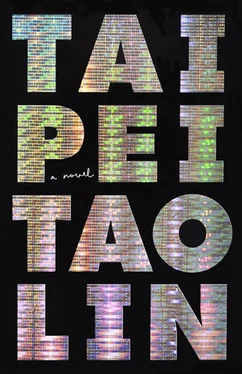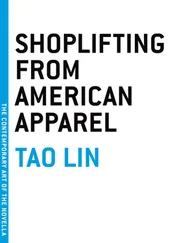“No,” said Daniel, and the Asian girl said she was buying marijuana from someone with a business card, which she showed Daniel, at his request. She bought two books and three Adderall and kneeled and asked if Daniel or Paul had a driver’s license, to move her friend’s car from Crown Heights to the Graham L train station for money. They discussed the car for what seemed like fifteen minutes, without resolution, then the girl, whose name was Annie, which Paul heard initially as Addy, removed a Chinese magazine from her bag and asked if Paul was good at translating. Paul said he couldn’t read Chinese or speak Mandarin fluently, and had an American accent sometimes, he’d been told. “I’m going to pee,” he said, and went to Verb, two blocks away. In line, behind two people, he thought that, from a certain point onward — beginning with his book tour, maybe — he would only appear in public if he’d ingested sufficient drugs to not primarily be a source of anxiety, bleakness, awkwardness, etc. for himself and/or others.
When Paul returned to Daniel and Annie they were talking about Annie’s boyfriend, who had attended the same college as Daniel, in Colorado. Annie’s boyfriend had gone to India after college. When he returned to America, three years ago, he died for a reason that Paul, who was thinking of how spring was to summer like a morning was to an entire day, brief and lucid and transitional, didn’t hear. Annie said her boyfriend’s funeral, due to a request he’d made in India, had been organized and promoted like a party and was “weird,” because it had been exactly like a party except everyone was wearing black.
• • •
In mid-July, a few weeks later, at a party that, instead of ending, had moved outside, through a window at the back of someone’s bedroom, onto an eighth-floor roof, Paul and Daniel were on an additionally elevated platform — corner-set, wall-less, square, smooth — like a landing pad for tiny helicopters.
Daniel was standing with limbs and neck uncoordinatedly extended, slightly striding in place — the pre-predatory stance of a chained thing that had broken free and didn’t yet know where to direct its vengeance, or what to do generally. His vision was focused horizontally, as if across a flat expanse. Then, with his back to one of the two edges dropping to the street, he approached an already fearful Paul — sitting cross-legged at the platform’s center, aware Daniel had been drinking steadily for hours and was probably on two or more drugs — who reacted preemptively, against what seemed like a purposeless entity unreasonably desiring his involvement, with defensive movements of his arms and hands, causing the situation, in Paul’s panicked state, to immediately seem like an unrestrained wrestling, though it probably looked more like an exaggeratedly confused handshaking. Paul tried to concentrate on flattening himself — on retaining a low, stable center — while repeatedly telling Daniel to “stop,” because it was “dangerous,” he heard himself say in a gravely serious, faintly humorous voice of uncertainly suppressed fear, but was distracted by how most of his thoughts were based on a reality in which he had fallen off the building. Should he close his eyes? What should he try to see? What would his mother do/feel? Could he grab things to disrupt his fall like in movies? Could one of these be his final thought? What would that mean? Why couldn’t he comprehend this? Should he think other things?
Eight people were in Erin’s five-seat car, which had gotten lost on its way from Paul’s book-release reading in Brooklyn to DuMont Burger, also in Brooklyn, when it was stopped by a police car, in Manhattan, around two hundred feet from the Williamsburg Bridge. The officer shined a flashlight through the driver’s window at the backseat without bending to see what was there, then asked Erin, 24, who had driven four hours that day from Baltimore to attend Paul’s reading and visit friends, to step outside the car. Paul, in the front passenger seat, hadn’t seen Fran, who was sitting partly on him, or Daniel, in the backseat, in five or six weeks, except once, briefly and separately, at a Bret Easton Ellis reading three weeks ago, when they’d avoided each other, and Fran, without context, had shown Paul a text from Daniel insulting her in a strangely formal, almost aristocratic tone. Paul had communicated regularly, the past month, only with Charles, by email or Gmail chat, mostly about what food they had eaten, or were thinking about eating, to “console” themselves. After being more social, April to July, than any other period of his life, Paul had returned to his default lifestyle, which varied, to some degree, but generally entailed (1) avoiding most social situations (2) not wanting to sleep most nights and not knowing why — he’d wanted since 2006 to title one of his books I Don’t Want to Sleep but I Don’t Know What I’m Waiting For —resulting usually in four to ten hours of looking at the internet, reading, masturbating, etc. until morning, when he would eat something and sleep until night.
Erin, back in her car, said the officer had looked at her two-months-expired, out-of-state driver’s license an abnormally long time, like he’d forgotten what he was doing, before quietly saying “be careful” and allowing her to continue driving, in what seemed to be an egregious oversight, without a ticket or decreasing passengers.
Paul first learned of Erin twenty months ago, in January 2009, when she commented on his blog and he clicked her profile and read her pensive, melancholy, amusing accounts, on her blog, of her vague relationships and part-time bookstore job and nights drinking beer while looking at the internet and classes at the University of Baltimore, where she’d reenrolled after a two-year break. Paul found and read — and reread, with high levels of interest — three long stories, each focused on an unrequited or failed relationship, that she had published in online magazines. Erin, being an attractive and adventurous-seeming person, was probably almost always, Paul imagined, entering or leaving — or, in some way, maneuvering — one or more relationships, but probably, between relationships, as a person who seemed to enjoy being alone sometimes, would become more active on the internet, for weeks or months, which over months and years would overlap with Paul’s nearly continuously high levels of internet activity. They would gradually communicate more and maybe begin emailing and — if neither died, entered long relationships, or left the internet — eventually meet in person. Paul viewed this process as self-fulfilling, not something he wanted to track or manipulate, so after one or two weeks had mostly internalized Erin’s existence — as a busy person with a separate life, in a different city — and had stopped thinking about her by mid-February, when he met Michelle, with whom he was in a relationship both times, before tonight, that he met Erin in person.
The first time was in July, when Erin visited New York City for the release of Charles’ poetry book. The day after the release Paul was amused and excited for them, at a BBQ, when Charles said he had kissed Erin.
The second time was in September, one year ago, when Erin attended Paul’s reading in Baltimore. At a restaurant, with a large group of people, but talking only to each other, Paul asked about Charles, whom Erin had visited in August. Erin said she had changed her plane ticket and left earlier than planned because Charles had become gradually less affectionate, culminating with a night when, after sex, he said he didn’t feel anything for her, then consoled her, as she cried, in his kitchen. Paul liked Erin’s forthright, unhesitant, nonjudgmental answers and that she was able — already, despite what seemed like strong disappointment — to view and describe what had happened as at least partly amusing. When Erin asked about Michelle, as they walked to her car, Paul automatically said Michelle was “good” while distinctly recalling a recent night when he complained he always offered her food or drink before himself, then after Michelle said she’d be happy to do that, now that she knew it mattered to him, said it didn’t matter to him and she shouldn’t change. Exiting Erin’s car, at the hotel he was staying in for one night, because a mysterious Johns Hopkins professor, whose Face-book name was “Cloud Bat,” had bought him a room, Paul thought that if he weren’t in a relationship with Michelle he would ask Erin upstairs, where they would, he vaguely imagined, continue talking.
Читать дальше












